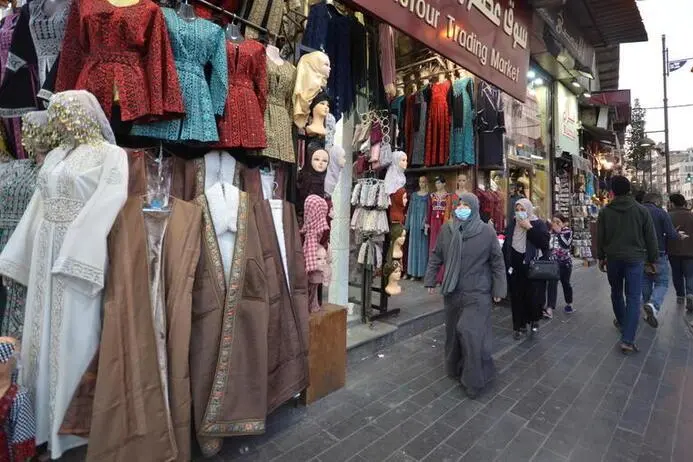PHOTO
The demand has been increasing slowly and gradually, especially since the government’s decision to pay public sector employees’ salaries before eid, the sector representatives said.
The early salary payment has boosted citizens' purchasing power, they said, adding that the arrival of Arab and foreign tourists in addition to the large number of expatriates who returned to the Kingdom to spend the holidays are also positive factors, they said.
Asaad Qawasmi, representative of the clothing, garment and jewellery sector at the Jordan Chamber of Commerce, said that the demand has been lower than merchants' expectations this season, particularly when compared with previous ones.
“The early payment of salary has not helped improve the activity of the sector as expected. Buying sweets and sacrificial animals for Eid Al Adha are many people’s priority now," Qawasmi told The Jordan Times on Sunday.
The hot weather has also limited people from going out, he said.
The demand is expected to rise during the next two days prior to eid, especially during the evening, he said.
Qawasmi pinned hopes on the return and reopening of other economic sectors such as wedding halls and the beginning of the wedding season after eid.
“We are expecting better and more demand after eid,” he added.
He also noted that the prices are the same as previous seasons and there has not been any price hikes, however, if sea freight prices remain high, prices of winter clothes will be more expensive.
Raed Hamada, representative of the food sector at the Jordan Chamber of Commerce, said that the demand for sweets and foodstuff during the past period has been “extremely low”, noting that since the salaries were paid on Thursday, the demand has been slowly rising but “definitely lower than usual”.
“Compared with the years prior to the pandemic, the demand for desserts and sweets is below the expected levels as people are still financially affected,” Hamada told The Jordan Times on Sunday.
Hamada pointed out that Jordanians mostly buy eid sweets only a day or two before eid, expecting a higher demand during those two days.
According to Hamada, all economic sectors will need approximately three to five years to recover from the pandemic’s effect.
“All sectors are affected, therefore, there is no better recovery for one sector as they are all connected. Recovery will take a long time, but we are hopeful and optimistic with the start of the reopening of the sectors in the Kingdom,” he continued.
Meanwhile, butcher shop owners complained that some municipalities impose high fees on barns outside the Amman Municipality zone.
Abdallah Terro, a butcher shop employee in Amman, said that some municipalities charge fines of up to JD350 on barns, of which JD200 are refundable after Eid Al Adha until the barns are cleaned, while the remaining JD150 are for rental fees.
The price of the imported sheep ranges from JD190 to JD250, depending on its weight, while the price of local sheep ranges between JD230 and JD350, Terro told The Jordan Times on Sunday.
“The price increase is unreasonable and relatively high compared with past years. The price has increased approximately by JD1 per kilogramme, therefore, the demand is not as usual but it is relatively good,” he said.
© Copyright The Jordan Times. All rights reserved. Provided by SyndiGate Media Inc. (Syndigate.info).





















